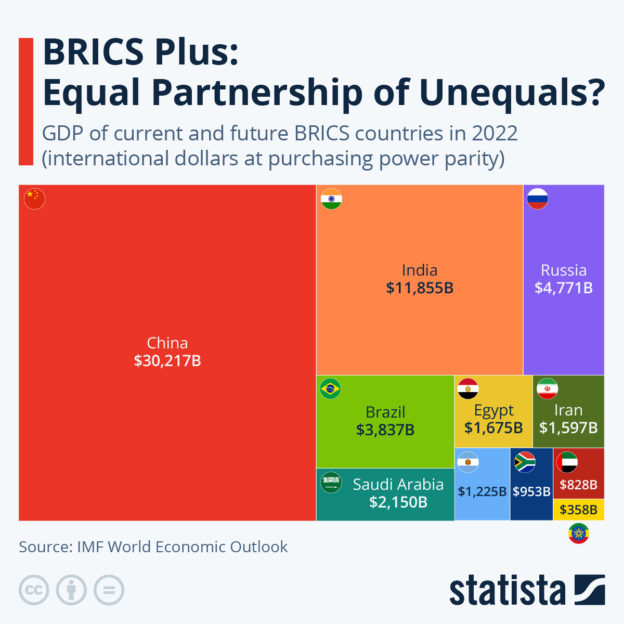Tangible economic benefits may be some distance away, experts say, but the symbolic benefit is joining an alliance separate from, or opposed to, Western interests.
The BRICS group of five emerging economies has offered membership to six more countries during its annual summit in Johannesburg this month. If they accept, Saudi Arabia, the United Arab Emirates (UAE), Iran and Egypt would become the first countries in the Middle East and North Africa to join the bloc, alongside Ethiopia and Argentina, as soon as January.
Comprising Brazil, Russia, India, China and South Africa, the group represents 40% of the global population and a quarter of the global gross domestic product, but it has not moved in any set direction as drastic differences prevail in the economies of its members.
More complicated than it looks
Michael Tanchum, nonresident fellow at the Middle East Institute, told Al-Monitor that BRICS has created an international public forum for dissatisfaction with the West and the United States in particular. But, he added, “It has yet to become an institutional force for an alternative economic or security order.”
In the 14 years since it was created, BRICS’ only major achievement has been the establishment of the New Development Bank, also known as the BRICS Bank. Having added Bangladesh, Egypt and the UAE among its shareholders along with the BRICS members, the multilateral development bank has around $50 billion available, and it has approved loans of nearly $30 billion since its launch in 2014.
Escaping sanctions became a uniting factor for BRICS, and one of the main reasons for expansion. The plan accelerated after Western sanctions on Russia following its invasion of Ukraine.
Adding Iran makes sense as it is also hit by sanctions. Roberto Neccia, former diplomat in Tehran and researcher on Iran, told Al-Monitor, “At the moment, the symbolism associated with the initiative is more important than its actual implementation.”
It is premature to assess any concrete benefits for Iran, he said, but “the Iranian circle around [Iranian Supreme Leader Ayatollah Ali] Khamenei sees the membership as an important component of the strategy of forming political and economic alliances not aligned with a US-led axis.”
Dollar in trouble?
In addition, BRICS has been trying to bring about the end of dollarization for a decade. However, even their attempts to launch a common BRICS currency hit major roadblocks, as around 88% of international transactions continue to be conducted in dollars and 58% of global foreign exchange reserves remain in US dollars.
Consequently, Russia, China and Brazil have turned to non-dollar currencies for cross-border transactions and tried to shift currency reserves from the dollar into gold.
If Saudi Arabia and UAE, the largest energy producers in the Middle East, join BRICS, the bloc’s upgraded economic clout might improve its chances of deploying alternative currencies.
But Tanchum noted, “BRICS membership offers little new economic benefit from China that was not readily available to Iran, Egypt, Saudi Arabia or the UAE. The currencies of Saudi Arabia and the UAE are currently pegged to the US dollar.”
Riyadh is awaiting further details on membership requirements. However, Sebastian Sons, senior researcher at CARPO in Bonn, told Al-Monitor, “For both the UAE and Saudi Arabia, the potential BRICS membership provides an excellent opportunity to diversify their economic and political partnerships. In this regard, they aim to enhance cooperation with non-Western partners such as India or Brazil. Furthermore, their relations to China will further intensify not only on an economic but also on a political level. I wouldn’t be surprised if Saudi Arabia would join the Shanghai Cooperation Council soon.”
Divergent foreign policy goals and a lack of cohesion among its members have troubled BRICS. Though decisions are taken with consensus, there is no official website or proper mechanism, and each country has autonomy to determine its own course of conduct. Two of the founding members China and India are in opposite geopolitical alignment and have ongoing disputes over shared borders.
Boosts Iranian-Saudi reconciliation
Even if Egypt and Argentina decide to join, they both happen to be the top two largest debtors of the International Monetary Fund, while prospective new members Iran and Saudi Arabia only recently restored diplomatic relations.
“The normalization of ties with Saudi Arabia through Beijing is part of Tehran’s policy to overcome diplomatic isolation,” Neccia noted.
Nevertheless, Sons feels that BRICS could strengthen the diplomatic reconciliation between Iran and Saudi Arabia in an economic direction. “The potential BRICS participation could become a significant game changer in the Iranian-Saudi relationship as it might be transformed from a rather tactical to a strategic cooperation model,” he said.
Finally, as Tanchum pointed out, “In the short term, Riyadh and Abu Dhabi are looking to Beijing as an alternative to Washington.” While Beijing is willing to play its role to diminish US influence in the region and elevate its own, he argued that China’s priority to broker a balance between Saudi Arabia, the UAE and Iran without becoming a security provider.
Still last month, China and the UAE announced their first-ever joint fighter military drills, in a move that is set to boost Beijing’s defense ties in the Gulf region. Last week, The Wall Street Journal report that Saudi Arabia is mulling a Chinese bid to build its nuclear program, a move that adds another dimension to China’s expansion in the Middle East.
https://www.al-monitor.com/originals/2023/08/saudi-arabia-uae-iran-give-brics-economic-boost-wont-rival-us-leadership





